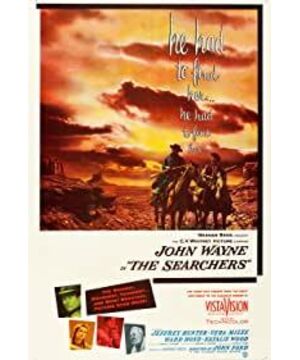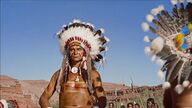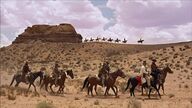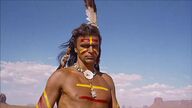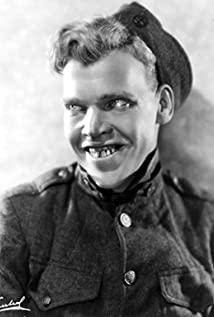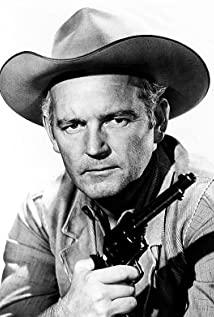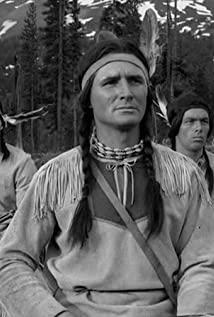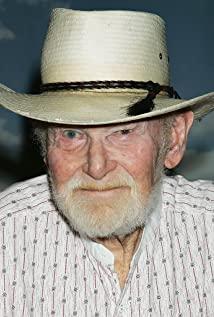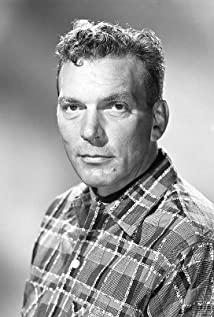"My name is John Ford, and I make westerns." This is Ford's self-introduction to Xixi Demir. It will become a well-known registered trademark of Ford in the future.
From 1917 in the silent film era to directing the last work "Seven Women" in 1966, for half a century, Ford directed a total of 112 feature films and many short films, including nearly 60 westerns. Therefore, it is incredible to discuss "Westerns" without mentioning John Ford's outstanding contributions. However, in Ford's own mind, it seems that he has always intentionally underestimated the value of the westerns he made. When he was visited by the British BBC television network in 1968, he once said that "the so-called'good films' I have made, none of them are Western films". Strangely, John Ford’s six Oscar-winning works include "The Whistleblower" (1935), "The Flower of Rage" (1940), "Green Hills and Green Valley" (1941), and "Pengmen Jinshi is the King". "(1952) and the two documentaries "Blood Battle Midway" (1942) and "December 7th" (1943), indeed none of them are Westerns. Does this mean that filmmakers have contempt for the genre of Western films?
However, in the eyes of film critics, Ford and his westerns were not completely ignored. Represented by the voting results of the "Top Ten Best Films and Top Ten Directors in the World" held by the British film magazine "Picture and Sound" every ten years, Ford was selected as one of the top ten directors in 1972, 1982 and 1992. He The director of "Searcher" was also selected as one of the top ten best films in 1982 and 1992, becoming the only representative Western film selected in the past years.
Why "Searcher" can surpass Ford's own "Flying Guanshan", Howard Hawkes' "Red River Tribulation", George Stephens' "Wild Wilderness", Fred Zinnerman's "Noon", etc. The film has become the most admired work among all westerns? What are its distinctive features?
Western films in the past often gave people the same impression that the whites who immigrated to the west were attacked and killed by the Indians, and the white heroes in turn took revenge on the Indians. In these stereotyped films, the Indians all play the role of villains as "bad guys", and the extermination of the Indians by the whites is taken for granted and acts for the heavens. This kind of narrative view, which stood entirely on the racist standpoint of the big whites, began to be questioned in the 1950s during the Cold War between the United States and the Soviet Union. "Searcher" brought this suspicion of racism into the world of westerns, re-examining the antagonistic relationship between white Americans and Indians. This is an amazing breakthrough for westerns.
The actor Ethan Edward is not a traditional white hero, but a tramp with many problems. He fought with the Southern Army, but did not return home three years after the end of the Civil War, and returned with the Northern Army's gold coins of unknown origin. Judging from his stubborn behavior, Ethan is obviously an arrogant racist, and he has extremely complicated erotic desires hidden deep in his heart. It is obviously an extraordinary attempt to let such a person dominate the direction of the whole story. However, the success of "Searcher" is exactly the result of John Ford's victory in insurance.
This film uses general traditional methods to process the credits. The theme song of "The Searcher" composed by Max Tanner sounded leisurely with the subtitles, revealing the theme of the film: "What makes a man wander? What makes a man wander? What makes a man abandon his happiness and leave his home? Ride away, Ride away, ride away...". This "what" is the theme that the director deliberately leads the audience to pursue.
"Searcher" has two points that are most admired: in terms of form, it establishes a wild-home, primitive-civilized duality with a clear visual image, and forms the narrative structure of the whole film based on this; In terms of content, it has shaped Ethan Edwards, the most complex and obscure protagonist in the history of western movies, and transformed his secret passions into strong vengeance anger, making the struggle between whites and celebrities in this film go beyond simple The racial dispute of Ethan became the tragedy of the struggle between Ethan's personal "civilized me" and "barbaric me". The depth of the theme far surpasses other westerns, becoming a unique classic among "psychological westerns".
What is even more surprising is that such a complex form and content have been successfully established in the opening scene of "Searcher" in just two or three minutes, showing Ford's extraordinary skill at the peak of his creation. The first shot of the film concisely and powerfully establishes the image of inside/outside the door, and the person who opens the door is not the man who is the traditional house owner in Western films, but the house’s hostess Martha. Throughout the scene, Martha is the dominant player, but her husband, Aron, becomes a supporting role. It was Martha, not Aron, who said "Welcome home, Ethan". On the other hand, Ethan also showed completely different feelings for the host and hostess of this house. He only shook hands calmly with his brother Alang; but for his sister-in-law, he embraced her shoulders with both hands and kissed her affectionately on the forehead. Masha also seems to appreciate Ethan's "excessive enthusiasm", so her sight has never left Ethan, and she leads Ethan into the house by walking backwards. Ford used a natural and mysterious way to deal with the unusual relationship between the two uncles and sisters-in-law, and it was obvious when one shot. Afterwards, before Ethan left home with the cavalry, Martha touched Ethan's coat tenderly in front of the window. This situation made Clayton, a priest and captain of the cavalry, unexpectedly see it, but his reaction was to silently look away and pretend not to see. From this set of implicit shots, the audience already understands that the relationship between Ethan and Martha is a kind of "moral taboo", and even people who know the secrets (such as Clayton) are reluctant to touch it. At the same time, this set of shots also confirms how appropriate Masha's dominance at the beginning of the film is, because Masha is the only factor that attracts Ethan to go home.
After understanding Ethan's obscure feelings for Martha, it is not difficult to understand why Ethan's hatred of Chief Scar (Scar) is so strong and paranoid. Ethan did not hesitate to spend time (five years) and huge sums of money (thousand yuan bounty) to find Skar's whereabouts. The ostensible reason was to rescue his niece Debbie, who was taken captive by the Indians, but was actually to kill his beloved sister-in-law. The culprit smashed thousands of pieces to vent his hatred. If we dig deeper into Ethan’s revenge, we can find that Ethan’s vow to kill Skar is not only to maintain civilization and social justice, but to eradicate Ethan’s barbarism." The second self"-subconsciously eager to kill brothers and sisters-in-law, but in fact the incarnation of this desire, Chief Skar, completes this crime. Therefore, only by killing Skar can the guilt in Ethan's heart be eliminated. This deep psychological motivation explains Ethan's ritual and barbaric act of cutting Ska's scalp with a knife.
When Ethan finally found Debbie after all the twists and turns, and was shocked to find that Debbie had been assimilated by the Indians and became a "non-self race", his first reaction was to kill her. Ethan once gave his medal to Debbie, and placed his honor on her, as well as his feelings for Martha. Now, this girl has become a primitive barbarian, how can he bear it? The blood relationship between uncle and niece is no match for Ethan's paranoia, which proves that Ethan is essentially a "primitive" rather than a "civilized" person. Ironically, the person who stepped forward to save Debbie was Martin, who was not related to Debbie by blood. He is only the adopted son of Aaron and Martha, Debbie's nominal brother, and he even has half of the Indian blood. However, Martin insisted on his brotherhood for Debbie from beginning to end. In the last siege of the Skars by the cavalry, Martin insisted on searching for Debbie’s whereabouts first, but Ethan had already regarded Debbie’s life as a must, and said without shame: "Living with the celebrities is no longer alive. "As a result, Martin went to the enemy line alone to find Debbie, and shot and killed Skar, but Ethan's way of revenge was to cut Skar's scalp with a knife—just like the celebrity he was not ashamed of. It's exactly the same. At this point, John Ford’s critical view could not be more clear. The myth of the so-called big whiteism finally self-defeated.
The climax of the film is that Ethan rode after Debbie and came to the cave entrance. In the composition of the picture, Ford deliberately presents the same image of inside and outside the door as in the beginning of the film. After a scalp ritual, Ethan, who had washed his guilt towards Martha, once again came to the watershed between barbarism and civilization. Ethan lifted Debbie with both hands, as if lifting his lovely little niece back then. At this time, "love" replaced "hate", and Ethan's conscience discovered that he had restored his nostalgia for his homeland. So he took Debbie in his arms and said to her, "Debbie, let's go home."
The ending of the film is Debbie's return to a white civilized society. Martin also found a love destination. They all entered the door, and only the lonely Ethan stayed outside the door and continued to live his homeless life. Because in essence, Ethan has always been a barbarian who likes to live according to personal laws.
The structural and psychological symmetry of the whole film is rigorous and powerful from beginning to end, which is rare in westerns. The dual contrast between positive and negative, black and white, is not only seen everywhere in the aforementioned composition of the picture and the relationship between the characters, there are even contradictory dual identities in the same character. For example: Sam Clayton was a pastor with the Bible in his hand, and he became the captain leading the cavalry to kill the enemy (Ethan often deliberately asked him whether he was the pastor or the captain at the time when talking to Sam, which gave people a sense of absurdity. ); On the one hand, the blame old man Moss is the key person who discovered Skar, on the other hand, he is a mentally incompetent child; on the one hand, Luo Li loves Martin deeply, on the other hand, he is about to marry Charlie. Arrangements such as this make the secondary characters of the film break away from the typology that is customary in Western films, and make this rigorously structured story appear colorful in the process. However, among all supporting roles, the one who handled the most successfully was Martin, the guardian of Ethan. At the beginning, Martin was just an unremarkable character. He was late for dinner, and suffered Ethan's eyes when he first set out with the Cavalry (Neither "Uncle Ethan" nor "Mr." Terrible). However, after his adoptive parents were killed and his two sisters disappeared, Martin showed extraordinary resilience. During the five-year search, Martin experienced various trials and thrived. On the surface, the entire revenge action was led by Ethan, and Martin just followed him; in fact, Ethan was a paranoid white man—just as the rival Skar was a paranoid celebrity—he only thought of Vent out personal anger, but forgot the real purpose of the action. It was Martin who saved Debbie and Ethan against the guest in the end, otherwise, how could Ethan turn his heart and hold Debbie back home to a happy ending? Therefore, Ethan, who discriminated against Martin at the beginning, was willing to list the heir of the will as Martin (rather than Debbie who is blood relative), which shows his appreciation of Martin. There is no doubt that the only person who keeps his mind clear from the beginning to the end of the film is Martin-a white and Indian hybrid, an adopted son without a father and no mother. John Ford gave such a role the crown of true heroism, which was another breakthrough in the history of Westerns.
When it comes to narrative techniques, the performance of this film is also remarkable. John Ford used an extremely condensed approach to explain this "four-in and four-out" complex story: the flexible use of voice-overs and visual narrative are powerful tools. From the first time the North Kamanzi used the tactics of turning tigers away from the mountains to lure out the cavalry to attack the Aran Edwards family, it can be seen that the film is clever in narrative techniques. First of all, we saw that Ethan and others found that the cow was stabbed with a spear halfway through, presuming that it was a trick of the Indians. Captain Clayton immediately rushed back to the rescue, while Ethan and Martin stayed in place to take care of the horses to rest. Suddenly, the camera cut to Ethan's close-up, his eyes hesitated, as if he had a premonition. The camera then cut to Alang's home. Alang felt that he was approaching in a hurry, and hurriedly told Debbie to crawl out of the window and hide to his grandmother's grave. But when Debbie just sat down near the tombstone, the shadow of an Indian fell on Debbie. When the camera turned, it was a bust of Chief Skar. As the camera faded away, a tragic killing ended in the dark. When Ethan rushed back to the rescue, all he could see was the tragic killing of the Allang family that didn't have to be shown on the screen. In other words, Ford used the "dark field explanation" method to deal with the bloodiest and cruel scenes of the film, never took the opportunity to show off the so-called "entertainment" and "sensory stimulation", but only let the audience associate with the scenes that were deliberately omitted. The plot outside the screen greatly enhances the artistic level of the film. A similar condensing method was also used in the scene where Lucy was raped and killed by the Reds in Ethan's Canyon. Martin heard the horns of the cavalry from outside the screen, and then saw on the screen the victorious cavalry platoon returning home. The killing scenes of the Reds were all accounted for in the dark. Only Ethan and Martin found that the wild geese were being killed. The footage of the killing in the camp was intended for Martin to protest against the indiscriminate killing of women and children by the white cavalry. At the peak of his creation, John Ford deliberately improved the taste and connotation of Western films, and his sincerity is admirable.
The story of the film was originally very deep and full of anger, but John Ford added the humorous comedy in a timely manner to balance the atmosphere. This is another brilliant point of his directing the film. Assuming that Martin's letter to Lori was not explained in a comic narrative, how boring Ethan and Martin's five-year search journey would be!
View more about The Searchers reviews


